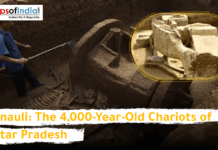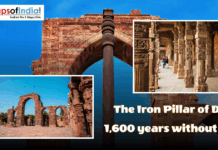My earliest memories of learning about the Partition have not been – as has been the case for me with other historical events – through books and films, but rather through talks as a very young girl with my maternal grandmother. As my consciousness grew, I was able to learn more about the subject and films were a great help in that. Nothing teaches history better than celluloid, I maintain.
So here is a list of the 7 best films depicting the Partition. They’re an odd sort of collection, varying from a Pakistani critically acclaimed film to hard core Bollywood fare.
Dharmputra (1961)
This 1961-film is directed by Yash Chopra – the second in his kitty – and, like any classic Bollywood fare, is full of melodrama. This is the story of two families pulled apart by the Partition. It highlights the religious divides and fundamentalism that came to define the event and how a Hindu family brings up an illegitimate Muslim child.
Garam Hawa (1973)
This Hindi-Urdu film is based on an unpublished short story by the famous Urdu writer Ismat Chughtai. Its on-screen adaptation was done by Kaifi Azmi. Focusing on the plight of a North Indian Muslim family in the aftermath of the Partition, it is one of the greatest Partition films made and possibly among THE greatest films ever made in Indian cinema. The central dilemma narrated in the film is whether or not the Muslim family should migrate to Pakistan.
1947 Earth (1998)
Earth, along with the preceding Fire and the subsequent Water, is part of Deepa Mehta’s Elements trilogy. Based on Bapsi Sidhwa’s Ice Candy Man, the film is narrated through the point of view of a Parsi child. The narrative focus thus allows for a distancing of the events and a critical look at them. The film focuses on the difference between the pre-Partition innocence and the post-Partition tragic loss of it that ensued. This is done by focussing on a group of friends of different faiths and the rifts between them that take place after the Partiton.
Train to Pakistan (1998)
1998 saw another Partition film apart form 1947 Earth. Train to Pakistan was based on the well-known novel by Khushwant Singh. The film sensitively portrays the ensuing violence of the Partition through the trope of the train. Set in a village near the India-Pakistan border, the quiet and peaceful lives of the Sikh landlords and Muslim labourers there is changed forever once a train carrying the bodies of people butchered as they were leaving the newly created Pakistan.
Gadar – Ek Prem Katha (2001)
This is a typical Sunny Deol film. It released the same year as the Oscar-nominated Lagaan. More melodramatic of the two, the film is set in the Punjab Partition and tells the story of a truck driver (Deol) who falls in love with an upper-class Muslim girl (Ameesha Patel). The story portrays the message that love is higher than any man-made boundary or class difference.
Pinjar (2003)
Pinjar is based on the Amrita Pritam novel by the same name. This National Award-winning film focuses on the life of young Puro who is kidnapped by Rashid as an outcome of a family feud. Unlike other films, which portray a pre-Partiton age of innocence, this film depicts the cracks in Hindu-Muslim relations that existed even before India was partitioned. Through the lives of Puro and Rashid’s families and the outcome of their lives post-Partition, the film manages to raise several important questions about religious identity, nationhood and belonging.
Khamosh Paani (2003)
Another woman-centric film, this is based completely in Pakistan, unlike the other movies in this selection. The film tells the story of middle-aged Ayesha and her son. Actually a critique of Zia-ul-Haq’s extremist Islamicism and its effect on the youth of Pakistan, the film manages to mention the Partition as well. This is done through flashbacks whereby Ayesha’s past is slowly revealed. Shown to be actually Sikh as a young girl, she is taken in by a Muslim man for various reasons during the Partition. She subsequently converts and marries her captor/saviour. Fearing that her secret will out in a religiously tumultuous time, Ayesha is forced to take dire measures.
All these films depict history through the point of view of a smaller group of individuals pointing towards the human cost of larger historical actions. Some of these films are rather close to my heart. Which is your favourite?




